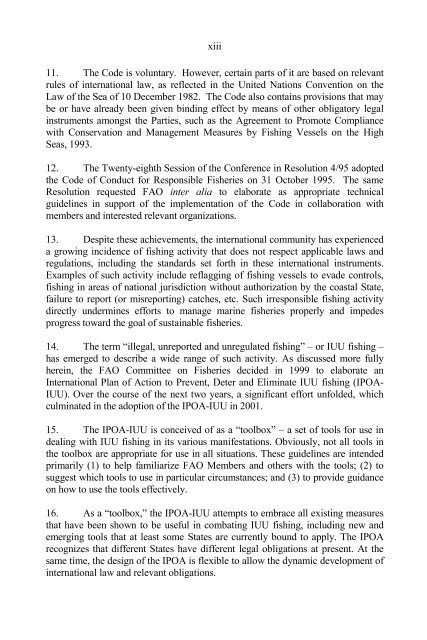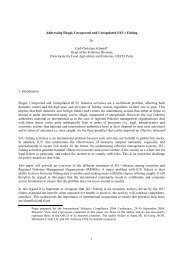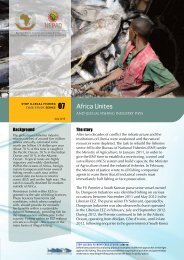Implementation of IPOA/IUU - International MCS Network
Implementation of IPOA/IUU - International MCS Network
Implementation of IPOA/IUU - International MCS Network
You also want an ePaper? Increase the reach of your titles
YUMPU automatically turns print PDFs into web optimized ePapers that Google loves.
xiii11. The Code is voluntary. However, certain parts <strong>of</strong> it are based on relevantrules <strong>of</strong> international law, as reflected in the United Nations Convention on theLaw <strong>of</strong> the Sea <strong>of</strong> 10 December 1982. The Code also contains provisions that maybe or have already been given binding effect by means <strong>of</strong> other obligatory legalinstruments amongst the Parties, such as the Agreement to Promote Compliancewith Conservation and Management Measures by Fishing Vessels on the HighSeas, 1993.12. The Twenty-eighth Session <strong>of</strong> the Conference in Resolution 4/95 adoptedthe Code <strong>of</strong> Conduct for Responsible Fisheries on 31 October 1995. The sameResolution requested FAO inter alia to elaborate as appropriate technicalguidelines in support <strong>of</strong> the implementation <strong>of</strong> the Code in collaboration withmembers and interested relevant organizations.13. Despite these achievements, the international community has experienceda growing incidence <strong>of</strong> fishing activity that does not respect applicable laws andregulations, including the standards set forth in these international instruments.Examples <strong>of</strong> such activity include reflagging <strong>of</strong> fishing vessels to evade controls,fishing in areas <strong>of</strong> national jurisdiction without authorization by the coastal State,failure to report (or misreporting) catches, etc. Such irresponsible fishing activitydirectly undermines efforts to manage marine fisheries properly and impedesprogress toward the goal <strong>of</strong> sustainable fisheries.14. The term “illegal, unreported and unregulated fishing” – or <strong>IUU</strong> fishing –has emerged to describe a wide range <strong>of</strong> such activity. As discussed more fullyherein, the FAO Committee on Fisheries decided in 1999 to elaborate an<strong>International</strong> Plan <strong>of</strong> Action to Prevent, Deter and Eliminate <strong>IUU</strong> fishing (<strong>IPOA</strong>-<strong>IUU</strong>). Over the course <strong>of</strong> the next two years, a significant effort unfolded, whichculminated in the adoption <strong>of</strong> the <strong>IPOA</strong>-<strong>IUU</strong> in 2001.15. The <strong>IPOA</strong>-<strong>IUU</strong> is conceived <strong>of</strong> as a “toolbox” – a set <strong>of</strong> tools for use indealing with <strong>IUU</strong> fishing in its various manifestations. Obviously, not all tools inthe toolbox are appropriate for use in all situations. These guidelines are intendedprimarily (1) to help familiarize FAO Members and others with the tools; (2) tosuggest which tools to use in particular circumstances; and (3) to provide guidanceon how to use the tools effectively.16. As a “toolbox,” the <strong>IPOA</strong>-<strong>IUU</strong> attempts to embrace all existing measuresthat have been shown to be useful in combating <strong>IUU</strong> fishing, including new andemerging tools that at least some States are currently bound to apply. The <strong>IPOA</strong>recognizes that different States have different legal obligations at present. At thesame time, the design <strong>of</strong> the <strong>IPOA</strong> is flexible to allow the dynamic development <strong>of</strong>international law and relevant obligations.
















